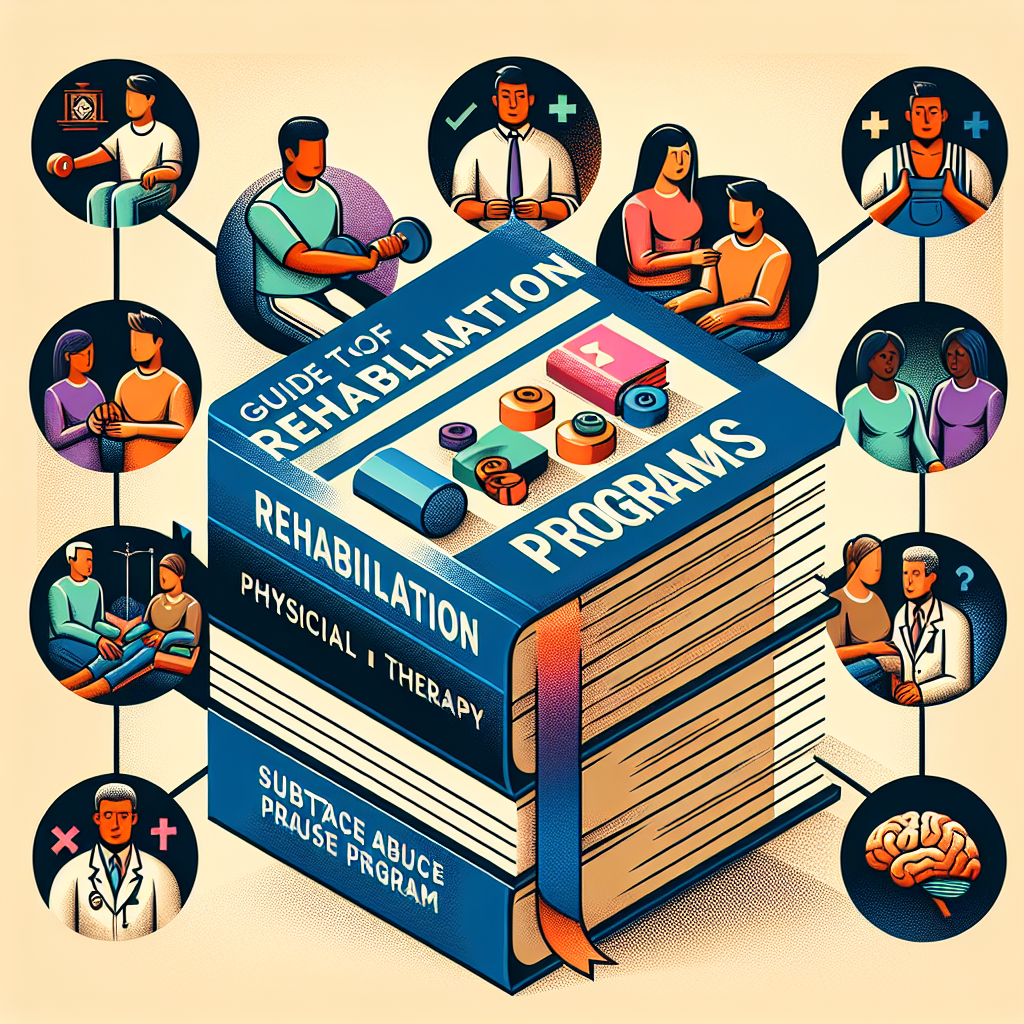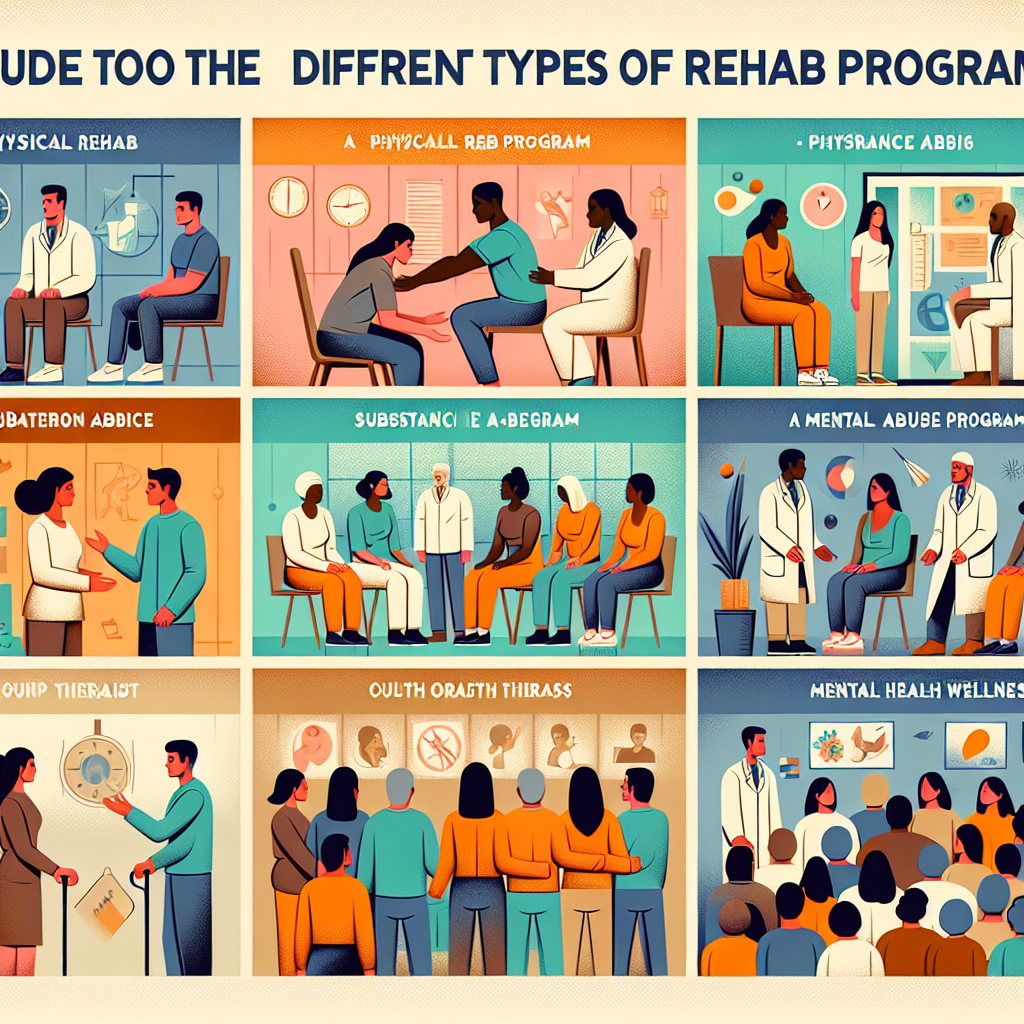-
Table of Contents

“Navigating Recovery: Your Comprehensive Guide to Rehab Programs”
Introduction
Rehabilitation programs are essential for individuals seeking recovery from various forms of addiction, physical injuries, or mental health issues. “A Guide to the Different Types of Rehab Programs” provides a comprehensive overview of the diverse rehabilitation options available, tailored to meet the unique needs of each individual. This guide explores inpatient and outpatient programs, specialized treatments for substance abuse, physical therapy, mental health rehabilitation, and holistic approaches. By understanding the distinct features and benefits of each type of rehab program, individuals and their families can make informed decisions to support a successful recovery journey.
Understanding Inpatient vs. Outpatient Rehab Programs
When embarking on the journey to recovery, understanding the different types of rehab programs is crucial. Among the most common and effective are inpatient and outpatient rehab programs. Each offers unique benefits and caters to different needs, making it essential to choose the right one for your specific situation. By exploring the distinctions between these two types of programs, you can make an informed decision that sets the foundation for a successful recovery.
Inpatient rehab programs, also known as residential treatment, require individuals to live at the treatment facility for the duration of their program. This immersive environment provides a structured and supportive setting, which can be particularly beneficial for those with severe addictions or co-occurring mental health disorders. The round-the-clock care and supervision ensure that patients are constantly monitored, reducing the risk of relapse and providing immediate assistance if any issues arise. Moreover, the structured daily schedule, which includes therapy sessions, group activities, and educational workshops, helps individuals develop healthy routines and coping mechanisms.
On the other hand, outpatient rehab programs offer a more flexible approach to treatment. These programs allow individuals to live at home and continue with their daily responsibilities, such as work or school, while attending scheduled treatment sessions. This flexibility can be a significant advantage for those who have strong support systems at home or who cannot afford to take extended time off from their obligations. Outpatient programs vary in intensity, with some requiring daily attendance and others meeting a few times a week. This adaptability makes outpatient rehab a viable option for those with milder addictions or those transitioning from inpatient care.
While both inpatient and outpatient rehab programs aim to achieve the same goal of recovery, the choice between the two often depends on the severity of the addiction, the individual’s personal circumstances, and their support network. For instance, someone with a long history of substance abuse and multiple failed attempts at sobriety might benefit more from the intensive nature of inpatient rehab. Conversely, an individual with a stable home environment and a less severe addiction might find outpatient rehab to be more suitable.
Transitioning from one type of program to another is also a common practice. Many individuals start with inpatient rehab to establish a solid foundation for their recovery and then move to outpatient care as they gain more confidence and stability. This step-down approach allows for a gradual reintegration into everyday life while still receiving the necessary support and guidance.
It’s important to remember that the journey to recovery is deeply personal and unique to each individual. What works for one person may not work for another, and that’s perfectly okay. The key is to remain open to the process and to seek out the resources and support that resonate with you. Whether you choose inpatient or outpatient rehab, the commitment to change and the willingness to seek help are the most critical factors in achieving lasting sobriety.
In conclusion, understanding the differences between inpatient and outpatient rehab programs can significantly impact your recovery journey. By carefully considering your specific needs and circumstances, you can choose the program that best supports your path to a healthier, substance-free life. Remember, the decision to seek help is a courageous first step, and with the right program, you can build a strong foundation for a brighter future.
Exploring Specialized Rehab Programs for Different Addictions
Exploring specialized rehab programs for different addictions can be a transformative journey, offering hope and a path to recovery for those struggling with substance abuse. Understanding the various types of rehab programs available is crucial in finding the right fit for an individual’s unique needs. Each program is designed to address specific addictions and provide tailored support, ensuring a comprehensive approach to recovery.
One of the most common types of rehab programs is the inpatient or residential treatment program. This type of program requires individuals to live at the treatment facility for a specified period, typically ranging from 30 to 90 days. Inpatient programs offer a structured environment, free from external triggers and distractions, allowing individuals to focus entirely on their recovery. These programs often include a combination of medical detoxification, individual and group therapy, and holistic treatments such as yoga and meditation. The immersive nature of inpatient rehab provides a solid foundation for long-term sobriety.
For those who require a less intensive approach, outpatient rehab programs offer flexibility while still providing essential support. Outpatient programs allow individuals to live at home and continue with their daily responsibilities while attending treatment sessions several times a week. This type of program is ideal for those with mild to moderate addictions or those who have already completed an inpatient program and need ongoing support. Outpatient rehab typically includes counseling, behavioral therapy, and support group meetings, helping individuals develop coping strategies and maintain their sobriety.
Another specialized rehab program is the intensive outpatient program (IOP), which serves as a middle ground between inpatient and outpatient treatment. IOPs require individuals to attend treatment sessions more frequently than standard outpatient programs, often for several hours a day, multiple days a week. This level of care is suitable for individuals who need more support than traditional outpatient programs but do not require 24-hour supervision. IOPs provide a structured environment while allowing individuals to apply the skills they learn in real-world settings.
For those struggling with opioid addiction, medication-assisted treatment (MAT) programs offer a unique approach. MAT combines behavioral therapy with medications such as methadone, buprenorphine, or naltrexone to reduce cravings and withdrawal symptoms. This type of program is highly effective in helping individuals achieve and maintain sobriety, particularly when combined with counseling and support groups. MAT programs are often tailored to the individual’s specific needs, ensuring a personalized approach to recovery.
Holistic rehab programs take a different approach by focusing on the individual’s overall well-being rather than just the addiction itself. These programs incorporate alternative therapies such as acupuncture, art therapy, and equine therapy, alongside traditional treatments like counseling and group therapy. Holistic rehab aims to heal the mind, body, and spirit, promoting a balanced and healthy lifestyle. This type of program is ideal for individuals seeking a more comprehensive and integrative approach to recovery.
Lastly, faith-based rehab programs offer spiritual guidance and support for those who find strength in their religious beliefs. These programs incorporate faith-based principles and practices, such as prayer, meditation, and scripture study, into the treatment process. Faith-based rehab provides a sense of community and purpose, helping individuals find meaning and motivation in their recovery journey.
In conclusion, exploring specialized rehab programs for different addictions reveals a wide range of options tailored to meet individual needs. Whether it’s the structured environment of inpatient rehab, the flexibility of outpatient programs, the comprehensive support of IOPs, the targeted approach of MAT, the holistic focus on overall well-being, or the spiritual guidance of faith-based programs, there is a path to recovery for everyone. By understanding these options, individuals can find the right program to support their journey towards a healthier, sober life.
Q&A
1. **Question:** What are the main types of rehab programs discussed in “A Guide to the Different Types of Rehab Programs”?
**Answer:** The main types of rehab programs discussed include inpatient rehab, outpatient rehab, residential rehab, and intensive outpatient programs (IOPs).
2. **Question:** What is the primary difference between inpatient and outpatient rehab programs?
**Answer:** The primary difference is that inpatient rehab programs require patients to stay at the facility for the duration of their treatment, while outpatient rehab programs allow patients to live at home and attend treatment sessions at the facility.
Conclusion
In conclusion, “A Guide to the Different Types of Rehab Programs” provides a comprehensive overview of the various rehabilitation options available, highlighting the importance of personalized treatment plans. It underscores the necessity of understanding the specific needs of individuals to choose the most effective program, whether it be inpatient, outpatient, holistic, or specialized care. The guide emphasizes that successful rehabilitation often requires a combination of medical, psychological, and social support, tailored to foster long-term recovery and well-being.



